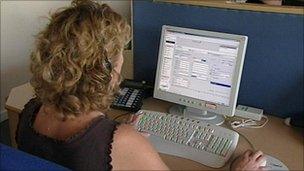New non-emergency health phone number to launch
- Published

Currently, around 14,000 people a day call NHS Direct for medical advice
A non-emergency telephone number for NHS services is to launch across England, the Department of Health says.
The 111 number, which has been tested in four areas, will be available nationally by April 2013.
The service will replace NHS Direct, which the government announced it was scrapping last year.
It will give health advice and information about services such as out-of-hours GPs, walk-in centres, emergency dentists and pharmacies.
The government says it will reduce confusion and effectively abolish the concept of "out-of-hours" in the NHS.
After pilot schemes in County Durham, Nottingham, Lincolnshire and Luton, the service will be extended to the Isle of Wight and Chesterfield before Christmas.
The government says NHS Direct is expected to "retain a role" in its the delivery, staffed by call advisers supported by nurses.
'Simple number'
Currently, around 14,000 people a day call NHS Direct for medical advice, with the service costing £123m a year to run.
Health Secretary Andrew Lansley said: "The new 111 service will mean patients can access the whole of the NHS through just one simple number.
"This marks another important step in modernising the NHS and giving patients greater control and choice over their healthcare."
Dr Clare Gerada, chairwoman of the Royal College of General Practitioners, said: "Not only will callers to the service be advised on what to do but also be directed to the appropriate local service to address their need consistently.
"However, patients should be aware that this is not a replacement for the current system and that they can continue to call their GP practice as normal."
The change will not affect existing NHS helpline services in Scotland and Wales.
Critics claimed the decision to scrap NHS Direct would undermine the quality of the service by reducing the number of qualified nurses answering calls.
And shadow health secretary Andy Burnham said last year that the service saved the NHS £200m a year and played a key role in taking pressure off the health service.
But last June the British Medical Association said MPs should consider scrapping the telephone service, saying it was not cost-effective.
- Published29 August 2010